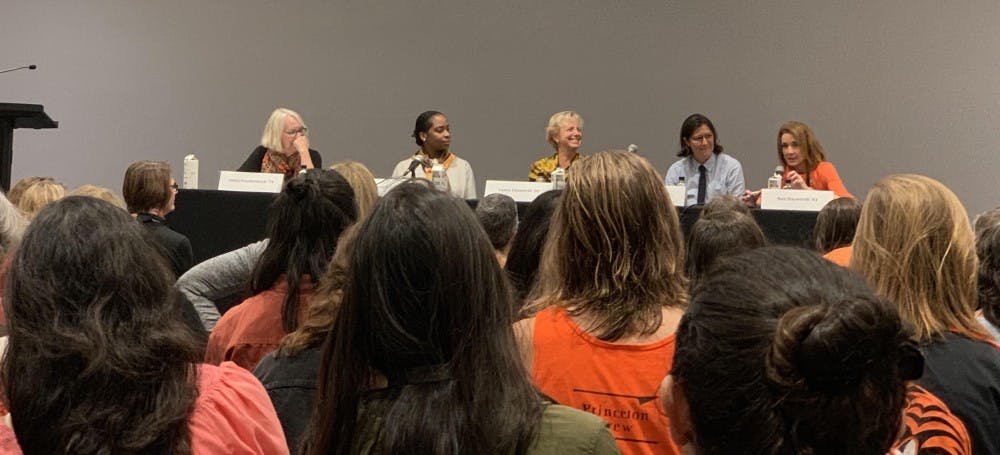Women make up 23 percent of senators and 19 percent of representatives. Female Tiger alumnae want to change that.
On Saturday, Oct. 6, five University alumnae discussed the importance of women in politics at the panel “She Should Run: Why and How More Princeton Women (Like You) Should Run for Office,” a part of the “She Roars” conference.
The discussion was moderated by Linda Frankenbach ’74, She Should Run board member and Fistmi Inc. founder and CEO.
The panelists included Andrea Campbell ’04, Boston City Council District 4 president; Laura Ellsworth ’80, Global Community Service Initiatives and Jones Day Partner-in-Charge; Nan Hayworth ’81, ophthalmologist and former congresswoman for New York’s 19th Congressional District; and Kristin Lynch ’05, National Press Secretary for N.J. Senator Cory Booker.
“Princeton women have proven that they are leaders, just the kind of people who should be leading on big stages,” Frankenbach began. “We just need a gentle push to run.”
Frankenbach noted that there are 29,000 total University alumnae, with 3,400 in attendance at the 2018 “She Roars” conference.
“How many of you have ever run for office?” Frankenbach asked, prompting a handful of women in the room to raise their hands.
“And how many of you have actually held office?” she continued, causing almost every hand to drop.

But when Frankenbach asked who wanted to run for office in the future, approximately a quarter of the women raised their hands.
Ellsworth said that her experience at the University armed her with the tools necessary to run in the primary for Pennsylvania governor earlier this year.
“Princeton gave me a respect for ideas and taught me that being one of the few women in the room does not matter,” Ellsworth said. “Women aren’t in it because they want to be someone. They’re in it because they want to do something.”
Lynch, recalling her own experiences behind-the-scenes for men in power, pointed out the importance of being “the woman or the woman behind the woman.”

“Kids don’t see themselves reflected in positions of power,” said Lynch, who called it a “real problem.”
When asked if there were different professional standards for men and women, Lynch said that women in the public eye are expected to be “smart, powerful, competent, and attractive,” calling it a “difficult line to toe.”
But as a woman of color, Campbell said she had to prove her ability to get someone to invest in her campaign and that there were various “biases and stereotypes to overcome.”
“We need people with different experiences and backgrounds, and a government that we're proud of and doesn’t waste money and time,” Campbell said.
She explained the importance of asking yourself when running for office: “Who are you? What are you about? What will you do when you get there?”
However, Hayworth did not feel disadvantaged, explaining that she always felt welcomed in Washington, D.C. during her time as a congresswoman.
“There are really good people in Washington on both sides of the aisle who want to do great things for all of us,” Hayworth said.
She said that the three things needed to be viable in politics are “time spent on the ground in the local party, relationships, and money.”
Ellsworth noted that she ran because of her desire to see real changes in Pennsylvania.
“I wanted to hear a voice in politics that I wasn’t hearing from either party,” Ellsworth said. “All I needed was the guts to stand up and open my mouth.”
Frankenbach continued the discussion by emphasizing the lack of female representation in Congress, pointing out that women make up 23 percent of senators and 19 percent of representatives.
She also noted that, prior to the conference, the panel speakers came to the consensus that their panel’s discussion “should be the beginning of something.”
“This is not a static moment,” Frankenbach said. “We want to start something.”
Frankenbach encouraged the alumnae to push their boundaries and to fight for their passions.
“We don’t have to accept the status quo,” she said. “It clearly hasn’t worked, and this week has shown us that.”
Frankenbach ended the panel by asking the audience once again to raise their hand if they were now thinking about running for office. This time, almost half of the women in attendance raised their hands.
“We are going to vote for all of you,” she said.
The panel took place at 9 a.m. in the Frist Campus Center Multipurpose room.








